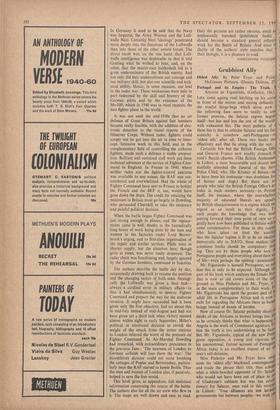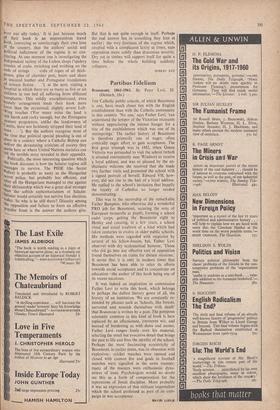Grubbiest Ally
Oldest Ally. By Peter Fryer and Patr McGowan Pinheiro. (Dennis Dobson, 25
Portugal and its Empire : The Truth.
Antonio de Figueiredo. (Gollancz, 18s.)
LIKE some ageing roué hitching up his corse in front of the mirror and staring defiantly the woeful binge-bags which alone now I the yellowing face seem to testify to son' former prowess, the Salazar regime beguil( itself—but less and less the rest of the world with exhausted lies. The most pathetic of a these lies is that to criticise Salazar and his fus autarchy is somehow anti-Portuguese—oi `oldest ally' after all. These two books n> effectively nail that lie along with the rest.
Certainly few but the British Foreign On and General Franco now readily stomach tl roué's flaccid charms. (The British Ambassad( in Lisbon, a most honourable and decent ma dutifully attended the funeral of the Seca Police Chief, who, like Kramer of Belsen--sa to have been his instructor—was doubtless fot of horses and dogs.) But there are st people who take the British Foreign Office's ati tudes in such matters seriously—in Portue itself, for instance, where the overwhelmit majority of educated liberals are appalle by British obsequiousness to a regime which the regard as an insult to their dignity. Fc such people the knowledge that two boot' putting forward their own point of view so ce gently have now been published in Britain will b some compensation. For those in this count', who have taken on trust the assertie that the Salazar regime is fit to be an idealists' democratic ally in NATO, these modest, of scientious books should be compulsory red ing. They are by three people who love th Portuguese people and everything about their wol of life—even perhaps the spitting—passionately Mr. Figueiredo is himself Portuguese, so w4, him this is only to be expected. Although tht part of his book which analyses the Estado Nov that is now so old covers some of the ground as Miss Pinheiro and Mr. Fryer, it I. in the main complementary to their work. f Mr. Figueiredo has spent the greater part of 111; adult life in Portuguese Africa and is now I, exile for regarding the' Africans there as bun* beings instead of beasts of burden. Now of course Dr. Salazar probably thinks bt thinks of the Africans as human beings too, j11.5 as he certainly thinks that what is happening Angola is the work of Communist agitators. Fcr him the truth is too undermining to be faceo. But Mr. Figueiredo, typical of the new Portv guese opposition, is young and vigorous ari` his unemotional, factual account of Portuga°,5,1 Africa today is an excellent exposé of an 01' man's self-delusion. Miss Pinheiro and Mr. Fryer have swel: aside the 'oldest ally' blackmail contemptuous' and made the phrase their title, thus echoill; what a white-bearded opponent of Dr. Salazar r who would not have been out of place in al. of Gladstone's cabinets but was too revolo tionary for Salazar, once said to this revieo'cf o in Lisbon : 'True alliances are not betwceti governments but between peoples—we wish Y° .Were our ally today.' It is just because much If their book is an unpretentious travel book, conveying so convincingly their own love 'of the country, that the authors' social and Political indictment of the regime is so con- Yincing. At one moment one is investigating the independent variety of the Lisbon shops (`spidery cousins of crabs, twitching and writhing on the• ends of strings . coils of ropes of all thick- Aitesses, piles of chamber pots, boots and shoes On uncured leather and Portuguese translations of science fiction . .'); at the next, visiting a hospital in which there are as many as five or six ilchildren in one bed all suffering from different `1 complaints. This mildly unsophisticated, even '`homely arrangement lends their book more n force than the occasional, slightly severe Left- 1,. Wing touches (Tor many miles the land is harsh and rocky enough, but the Portuguese ,Peasant proprietors, unlike the landowners of Castile, have not fecklessly 'stripped their land of ,(trees . . .'). But the authors recognise most of ,the time that political special pleading is out of Place in a country where a Catholic Bishop can deliver the devastating criticism of society they quote here or where United Nations statistics can tell the terrible story revealed in their appendix. Politically, the most interesting question which the book discusses is how the Salazar regime still manages to survive. The PIDE (the Secret Police) is probably as nasty as the Hungarian secret police, but probably less efficient, and after all the Hungarians Managed to rise against their dictatorship which was a great deal stronger than the softish atithoritarianism of Salazar. Salazar would certainly not survive free elections todaySo why is he still there? Disunity among the opposition and failure to form an effective popular front is the answer the authors give.
But that is not quite enough in itself. Perhaps the real answer lies in something they hint at earlier: the very fustiness of the regime which, coupled with a complacent laxity at times, saps opposition more subtly than draconian severity. Dry rot in timber will support itself for quite a time before the whole building suddenly collapses.
ROBERT K EE











































 Previous page
Previous page